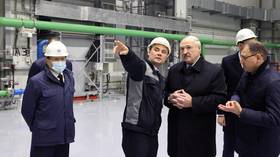Amid fears of second Chernobyl, Lithuania launches campaign to block energy exports from new Belarusian nuclear plant

A special commission has been set up by the government of Lithuania to restrict Belarus’ flagship new nuclear power plant from the country’s energy grid, after warnings of possible safety concerns at the Russian-built reactor.
In a statement on Wednesday, Vilnius’ Council of Ministers said that existing efforts to block energy produced by the Astravyets facility from reaching Lithuania were not working. Instead, Energy Minister Dainius Kreivys emphasised “the need to work toward a complete blockade of [the plant], and to enhance our energy independence and electricity network security.”
The group, headed by the country’s prime minister, will reportedly assess the security and integrity of Lithuania’s power grid, as well as “measures to reduce threats posed by the Astravyets Nuclear Power Plant.” There had previously been reports that, despite a ban on imports from the Belarusian facility, its electricity was still reaching consumers in the neighboring Baltic country.
Also on rt.com Another Chernobyl waiting to happen? Lithuania urges citizens to store canned food after ‘incidents’ at Belarusian nuclear plantThe reactor, built by agreement with the Russian state energy company, Rosatom Corp., came online in November despite strong objections from neighboring governments. Astravyets is located less than 60 kilometers away from the Lithuanian capital of Vilnius, and its government immediately banned Belarusian power in response to the start of its operations.
Rosatom Corp. and the Belarusian government have denied that any corners were cut in terms of nuclear safety, insisting that the fluctuations in the plant’s output are normal for a new reactor. However, an inspection by EU atomic experts that had been billed for December was postponed after officials from Minsk were reported to have pulled out of a meeting with the delegation. A spokesman for the facility, Oleg Sobolev, refused to comment on the reasons for the delay, but said that “Belarus is ready to show the experts the nuclear plant and to fulfil all voluntary obligations regarding it.”
Prior to the construction of Astravyets, Belarus’ power plants were meeting domestic energy demands almost entirely. As a result, there was speculation that the construction of the new reactor was an attempt to bolster the country’s standing in the electricity export market, with plans to sell power to Lithuania, Latvia and Poland. Warsaw has since added its voice to Vilnius’ in saying it does not wish to import from Belarus. While Russia would be a viable destination for exports, there is little demand for energy there.
Also on rt.com First reactor of Belarus’ controversial Astravets nuclear power plant achieves criticality, Baltic states are outraged by projectThink your friends would be interested? Share this story!














